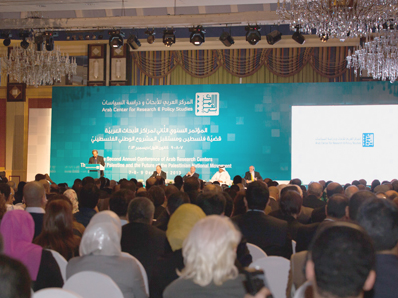 His Highness the Emir of Qatar Tamim Bin Hamad al-Thani was a guest of honor at the official opening ceremony for the ACRPS Second Annual Conference bringing together research centers from the Arab region and worldwide. Held in Doha on December 7-9, this year the conference addressed “The Palestinian Cause and the Future of the Palestinian National Movement”. Also attending the opening ceremony were a number of Qatari ministers and the head of the Qatari Shura Council H.E Muhammad bin Mubarak al Khulaifi, in addition to prominent Arab political figures, diplomats, researchers, academics, and activists.
His Highness the Emir of Qatar Tamim Bin Hamad al-Thani was a guest of honor at the official opening ceremony for the ACRPS Second Annual Conference bringing together research centers from the Arab region and worldwide. Held in Doha on December 7-9, this year the conference addressed “The Palestinian Cause and the Future of the Palestinian National Movement”. Also attending the opening ceremony were a number of Qatari ministers and the head of the Qatari Shura Council H.E Muhammad bin Mubarak al Khulaifi, in addition to prominent Arab political figures, diplomats, researchers, academics, and activists.
His Highness, the Emir of Qatar attended the opening ceremony which included speeches from President of the Constituent Assembly of Tunisia Mustapha Ben Jafar, former Jordanian Prime Minister Taher al-Masri, the UN Special Rapporteur for Human Rights in the Palestinian territories Richard Falk, and the Indian political thinker Aijaz Ahmad.
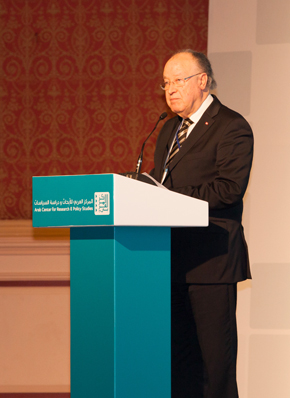 |
| Mustapha Ben Jafar |
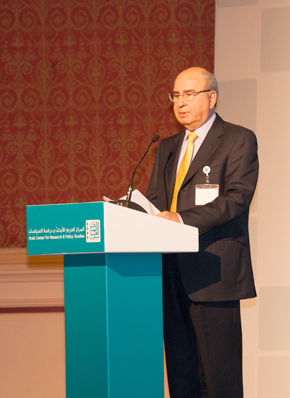 |
| Taher al-Masri |
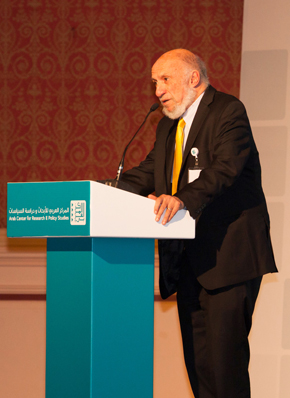 |
| Richard Falk |
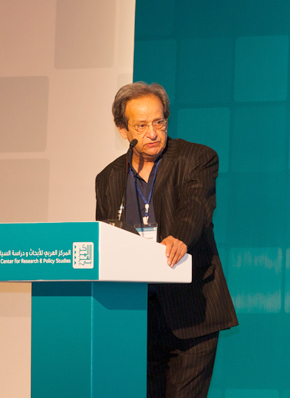 |
| Aijaz Ahmad |
|
Mustapha Ben Jafar said in his speech that the Palestinian cause remains the central concern for Arab citizens, specifically for those who have rebelled against corrupt regimes. These regimes, said Ben Jafar, consistently exploited the Palestinian cause to their own advantage, in the hope of staying in power and lending legitimacy to the tyranny regimes inflicted upon their people by using the slogan ‘No voice drowns out the sound of the battle [for the liberation of Palestine]’. Ben Jafar maintained that the Arab revolutions will provide an important boost to the Palestinian cause, since these revolutions have liberated Arabs and broke the barriers of fear and tyranny, demonstrating that the real power is with the people, reasserting both Palestinians and Israelis’ convictions that tyranny cannot last and that the will of the people will prevail.
The president of the Tunisian National Constituent Assembly also called for the unification of Palestinian ranks, the reform of internal affairs, and the reformation of the Palestinian Liberation Organization based on new foundations that are removed from internal and external influences. In this way, a vision for the Palestinian liberation movement can be materialized, one that enables the option of resistance in a manner that is appropriate to the times and that only resorts to the option of negotiation once circumstances are ripe for its success in freeing Palestinian lands and people. Such a movement, he stressed, would consist of “a national project aiming for peace without negating the option of resistance.”
The Battle for Legitimacy
UN Special Rapporteur for Human Rights in the Palestinian territories Richard Falk noted that efforts taken by various Palestinian forces toward finding a solution for the Palestinian cause have all resulted in blockage or failure. Falk delineated that the path of reliance on international legitimacy and United Nations resolutions to resolve the Palestinian crisis has not yielded results since Israel will not submit to these resolutions. Armed struggle, he continued, also failed in liberating Palestine, and has largely been abandoned except in cases of self-defense during Israeli attacks. Likewise, bilateral negotiations have remained at a standstill in light of Israeli intransigence, which extinguished the promise of Oslo as a turning point for the resolution of the conflict in a peaceful manner, thus rendering the entire operation a series of repeated negotiation rounds rather than one historic event that resolves the issue. Falk sees that four factors inhibit the feasibility of all of these options: Israel’s force on the ground, the expansion of settlements, Palestinian divisiveness, and unconditional American support for Israel.
In such a context, Falk expressed that the Palestinian national movement must take a new direction capitalizing on international experiences, such as the struggle against apartheid in South Africa. Such an approach, best termed as a Battle for Legitimacy, would be based on the increase of Palestinian movement across the globe with the support of international civil societies in imposing the legitimacy of Palestinian demands. He noted that the end of apartheid in South Africa did not materialize thanks to an ethical rethinking on behalf of the racist South African regime, but rather thanks to international pressure addressing the legitimacy of its continuity. In the same manner, international pressure with civil societies at its forefront could impose a shift upon Israeli leaders towards a real and fair resolution for the Palestinian crisis that is based on the legitimacy of the rights of the Palestinian people.
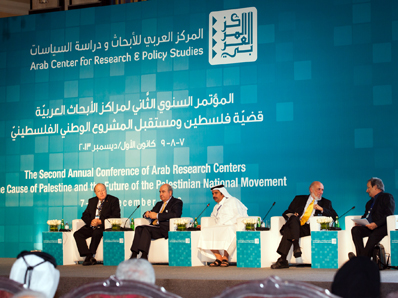 The ceremony concluded with important contributions from the Indian political thinker Aijaz Ahmad, who spoke of India’s official position on the Arab-Israeli conflict and its popular solidarity movement for the Palestinian cause, pointing out that the position of the late Indian leader Gandhi was in strict rejection of the Zionist entity, and that this has remained to date an official Indian position, manifesting in India’s vote rejecting the Zionist entity to join the United Nations. However, Ahmad notes that Indian support has witnessed change in the last forty years and that although the popular solidarity movement of activists and academics remains fixed to the legacy of Gandhi’s position, the current status of Palestinian division has sown uncertainty among these supporters. Nonetheless, stressed Ahmad, the Indian popular solidarity movement still believes in the foundation of Gandhi’s position, which is rooted in the colonial nature of Israel and its rape of the land and the freedom of the Palestinian people.
The ceremony concluded with important contributions from the Indian political thinker Aijaz Ahmad, who spoke of India’s official position on the Arab-Israeli conflict and its popular solidarity movement for the Palestinian cause, pointing out that the position of the late Indian leader Gandhi was in strict rejection of the Zionist entity, and that this has remained to date an official Indian position, manifesting in India’s vote rejecting the Zionist entity to join the United Nations. However, Ahmad notes that Indian support has witnessed change in the last forty years and that although the popular solidarity movement of activists and academics remains fixed to the legacy of Gandhi’s position, the current status of Palestinian division has sown uncertainty among these supporters. Nonetheless, stressed Ahmad, the Indian popular solidarity movement still believes in the foundation of Gandhi’s position, which is rooted in the colonial nature of Israel and its rape of the land and the freedom of the Palestinian people.
No Palestinian Movement without National Unity
On Saturday December 7 the conference started with a lecture by the Center’s director Azmi Bishara, followed by four academic sessions on “Israeli colonialism and its policies”; “The Arab Spring and the Arab-Israeli struggle”; “Israeli colonialist policies and their impact on Palestinian society” and “Patterns in shifts of Palestinian resistance movements.”
Key conclusions reached in this first day highlighted the impossibility of drafting a a new national movement that responds to the requirements of current times and that actively pushes towards the restoration of the rights of the Palestinian people without first achieving Palestinian national unity and the reform of the Palestinian Liberation Organization (PLO). Such an initiative would need to have the PLO as its main reference, provided that the organization’s reform rests upon new foundations that take into account the Palestinian reality on the ground and the Israeli occupation in its entirety.
The papers presented in the first session of the conference analyzed Israeli colonialism and its policies. Elijah Zureiq here questioned the allegations that Zionism differs from Western colonialism noting how Israel utilizes the same logic of surveillance, exercising its policies on the Palestinian body in order to protect itself, and keeping the Palestinian population in line and control. Zureik notes how the demographic balance and majority is the only factor that Israel is incapable of controlling. He also notes how the smuggling of semen from Palestinian prisoners to their wives is only one factor in understanding this demographic struggle, and represents a very precise level of resistance that provides an example of how actions of the resistance operate on levels that differ entirely from the operations of Israeli surveillance and control.
Researcher Hilal Elver presented a paper on “Water apartheid: The disproportionate and irrational use of water Israel and Palestine,” focusing on the water predicament in Palestine; Israeli control over water and the deprivation of Palestinians from it; and the extent of the struggle over water in agricultural areas, upon which the life and livelihood of people depends.
In the second session, devoted to the topic of Israeli colonialist policies and their impact on Palestinians, Palestinian researcher Youssef Courbage stressed that the two-state solution may become untenable in occupied Palestine in light of the Israeli population policy that has worked to raise the proportion of Jewish settlers at the expense of the Palestinian populations. He pointed out that the Jewish fertility rate has been increasing in the last ten years, whilst the Palestinian fertility rate has in the same period witnessed a noticeable decline.
Palestine as one of the reasons underlying the Arab revolutions
During a session entitled “The Arab spring and the Arab-Israeli struggle”, Egyptian columnist Fahmi Howeidi expressed how “the Palestinian cause is one of the main reasons sparking the Arab revolutions,” and pointed out that the new wave of political protests in Egypt arose after the outbreak of the al-Aqsa Intifada, enabling Egyptian youth to protest in Tahrir Square for the first time in a long while. Palestinian activist Salama Kila said “the Arab revolutions will sooner or later lead to the exposure of the Zionist state,” and added that the Arab Spring opposed rentier economies linked to the global imperialistic economy that internally serves only the minority in contrast with the marginalization of the majority in most Arab countries.
In his paper “Palestine and the Arab Spring in academic studies,” Palestinian researcher Sari Hanafi noted how American research centers dominated the discourse on the impact of the Arab revolutions and that regrettably most Arab academic studies did not yet study the link between the Arab revolutions and Palestine. Khaled Said, Egyptian researcher specializing in Israeli affairs addressed the Arab revolutions and the social and political transformations currently taking place in Israel. Said explained that Hosni Mubarak “helped the Zionist entity in the consolidation of its ranks for three decades,” and that the impact of the Arab Spring has been such that it has led to a demand in the acceleration of Arab minority integration in Israel in order to prevent the transmission of the revolutionary impact to these Arab minorities. Said concluded by saying that the Zionist intelligence service is “lighting up its offices” anew for the first time in a long while because of the Arab revolutions.
In another session entitled “Patterns in shifts of Palestinian resistance movements,” discussions focused on the necessity of Palestinian national unity. Dr. Mohsen Saleh said that an agreement on a Palestinian nationalist movement must pass through a consensus on the compatibility of various Palestinian factions, and locate a single reference that will form the basis for holding all parties accountable. He expressed his convictions that the reformation of the Palestinian Liberation Organization and its reform based on new foundations could be a candidate for providing such a unified reference.
Discussions
During the conference, a discussion session between politicians and activists from the various Arab countries took place offering the opportunity for heated debate between international figures supporting the Palestinian cause. The leader of the Algerian National Liberation Front Sadek Bougataya said that Algeria refuses to establish relations with Israel, neither openly nor in secret. He called for Arab elites and governments to take full responsibility towards the Palestinian cause, just as he called for the Palestinians to revive the Palestinian Liberation Organization. Moroccan Member of Parliament Hassan Tariq spoke in a similar fashion, calling for support for grass-roots efforts and the initiatives of Arab elites in service of the Palestinian cause. Jordanian academic and activist Maha al Khatib called upon Arab governments to revise their policies in dealing with Palestinian refugees, stressing the importance of respecting their human rights and international pacts in this regard. Former Egyptian ambassador Ibrahim Yousri pointed out that the Arab nation will never waive its rights in Palestine, expressing his optimism for the future of the Palestinian cause.